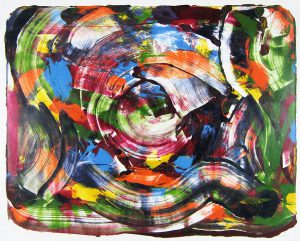View artwork
Classically trained, Littleton Alston is an African American sculptor who has sought to create works of art that focus on the essence of the human figure and spirit.
Alston was born in Petersburg, Virginia in 1958 and raised in an African American community in Washington D.C. From an early age, it was clear that Alston was destined to live a life devoted to creating art. When he was eight years old, he and his father were walking past a government building in Washington D.C. The young boy noticed two classical sculptures outside of the building and asked his father, “Dad, who made these?” His father replied, “I believe they were done by convicts, son.” Alston remembers thinking to himself, “If these are what convicts are able to create, then I want to be a convict.” Fortunately, Alston never was a convict, but he did become a noted African American sculptor. From his home in northeast Washington, D.C., he and his brothers rode their bicycles to nearby Capitol Hill, enjoying boyhood adventures in reflecting pools. At the same time, Alston was becoming subliminally aware of the public art and impressive buildings all around him. During middle and high school, his neighborhood was a dangerous place and his drawing talent, recognized by his mother, provided an alternative. He was accepted at the Duke Ellington School of the Arts in Washington, D.C., where he graduated from high school, winning the senior art prize before his graduation.
Awarded a scholarship to Virginia Commonwealth University in Richmond, he received his B.F.A. degree in Sculpture. He then went on to earn his M.F.A. from the Maryland Institute College of Art’s Rinehart Graduate School of Sculpture in Baltimore. In 1989, he was accepted to the artist residency program at the Bemis Center of Contemporary Arts in Omaha, Nebraska and, a year later, joined the faculty of Omaha’s Creighton University where he is an Associate Professor of Sculpture.
Alston maintains a sculpture studio in Omaha. His three-dimensional works are included in public and private collections throughout the country, and his work has been exhibited nationally and internationally. His artwork ranges from figurative bronze sculptures to stainless steel abstract works and large metal and assembled helmet sculptures. His public art commissions include sculptures for the Heider College of Business, Creighton University; Werner Park in Papillion, Nebraska; Dreamland Park and Martin Luther King, Jr. Plaza in Omaha; Nebraska State Capitol, Lincoln; and World Food Prize Foundation in Des Moines, Iowa. He has designed theatre sets in addition to working in the printmaking medium. Internationally, he has been associated with the Martine Vaugel Sculpture Studio in France’s Loire Valley and the International School of Painting, Drawing, and Sculpture in Montecastello di Vibio in Umbria, Italy.
Although Alston has worked in the abstract style, he prefers figurative work: “The human form holds endless fascination for me, and it is this vehicle through which I believe can best express the joys and sorrows of the human condition.”
Littleton Alston was included in the exhibition A Greater Spectrum: African American Artists of Nebraska 1912-2010 on view at the Museum of Nebraska Art from December 4, 2010 to April 3, 2011.










